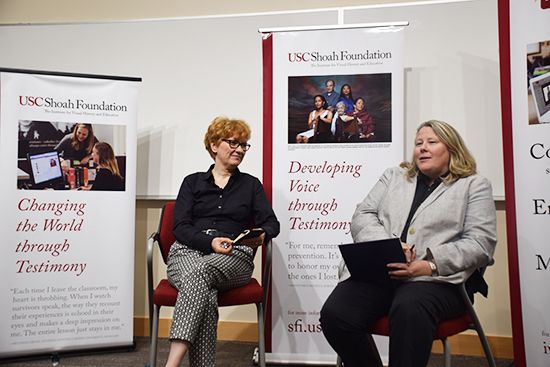IHRA's Kathrin Meyer Discusses Holocaust Education with Kori Street

Kathrin Meyer, left, with Kori Street
On June 17, Kathrin Meyer concluded her visit to USC Shoah Foundation with the International Holocaust Remembrance Alliance (IHRA) with an informative conversation with Director of Education Kori Street.
Meyer, IHRA’s executive secretary, and her colleague Laura Robertson, communications officer, were making their first trip to Los Angeles. The two came to learn about the Institute’s work and provide insight on the international field of Holocaust, genocide and human rights research, education and remembrance.
The IHRA is an intergovernmental body that works with countries and their experts to place political support behind the need for Holocaust education and remembrance. It was created in 2000 with three original member countries (Sweden, the United Kingdom, and the United States), and has since grown to 31 member countries and 11 observer countries.
Institutions, NGOs, and experts of member countries also participate in the organization. In that capacity, USC Shoah Foundation has sent executives to working group meetings and conferences as members of the U.S. Delegation. Though the group only meets twice a year, it also has a permanent office in Berlin, which Meyer and Robertson work out of.
Meyer has been at the IHRA since 2008. Before that, she studied educational science, received a Ph.D. by studying reorientation, de-Nazification and re-education in Germany after World War II, and worked for the Organization for Security and Cooperation in Europe.
During the conversation, Street posed questions to Meyer about what she wants to accomplish, what the biggest issue areas are, and what she learned from her visit. On this last point, Street asked Meyer for both good things USC Shoah Foundation is doing and areas it could improve. Meyer said she admires the clear goals the Institute sets for itself, but encouraged the Institute to educate and inform political bodies about what it is doing more.
“Don’t underestimate the impact you can have on the political level,” Meyer said.
That impact can come through the USC Shoah Foundation’s mission of recording and preserving testimony, which Meyer said is an important undertaking in this day and age.
“What I’ve heard for many, many years is, ‘How do we deal with this particular area and keeping the memory alive while having survivors pass away’?” Meyer said. “So testimony was one of the answers for how to preserve these memories and preserve these individual stories.”
Meyer also addressed what makes the IHRA a special organization, listing a number of unique qualities including that decisions made are not legally binding, the organization works on consensus (meaning every member has veto power), and the chairmanship rotates between members.
As the now 16-year old international body moves forward, Meyer said she hopes it begins to address contemporary issues that are more contentious, such as radicalization and the increasing amount of anti-Semitism present in many countries.
“It is so important to make it clear [to member countries] that this is something that is not your problem [alone], and though you might have particular forms of this particular problem, you’re not alone in it,” Meyer said. “It’s really something you’re in with all the other 30 countries.”